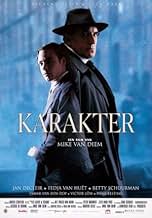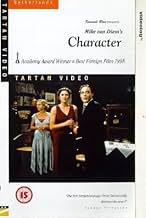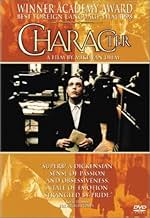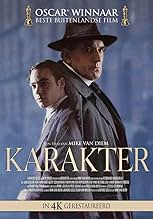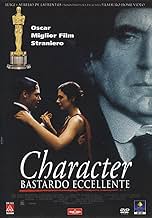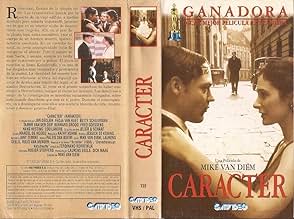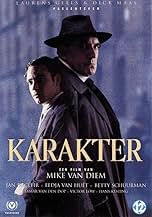IMDb-BEWERTUNG
7,7/10
11.700
IHRE BEWERTUNG
Jacob Katadreuffe lebt stillschweigend mit seiner Mutter zusammen, hat keinen Kontakt zu seinem Vater, der ihm ständig Steine in den Weg legt, und will um jeden Preis Anwalt werden.Jacob Katadreuffe lebt stillschweigend mit seiner Mutter zusammen, hat keinen Kontakt zu seinem Vater, der ihm ständig Steine in den Weg legt, und will um jeden Preis Anwalt werden.Jacob Katadreuffe lebt stillschweigend mit seiner Mutter zusammen, hat keinen Kontakt zu seinem Vater, der ihm ständig Steine in den Weg legt, und will um jeden Preis Anwalt werden.
- 1 Oscar gewonnen
- 18 Gewinne & 7 Nominierungen insgesamt
Empfohlene Bewertungen
10gevalher
This is one of the best movies that I've seen till now. I was reluctant at first to see this movie, because it was not a "Hollywood" product, but after so many times seeing the trailer at the theater it picked my curiosity.
The story was set in Netherlands, and it develops unfolding the relationship between a father and his son. This was one of the best movies I've seen in a long time, because it touches the bottom of our hearts making thinking us (the public) about our own -sometimes- conflictive relations with our parents.
The two main stars gave us a duel as I've never saw before in a film, and to top all of this, the supporting characters were all believable as well as the magnificent locations.
This films really told a story, reflects well its age and overall has a well developed timing so you'll never lose interest in what is next, and has so many twists that your interest never decays. But I really liked the final one. This one only scene pays all the money and time you spent seeing it.
OUTSTANDING!!
The story was set in Netherlands, and it develops unfolding the relationship between a father and his son. This was one of the best movies I've seen in a long time, because it touches the bottom of our hearts making thinking us (the public) about our own -sometimes- conflictive relations with our parents.
The two main stars gave us a duel as I've never saw before in a film, and to top all of this, the supporting characters were all believable as well as the magnificent locations.
This films really told a story, reflects well its age and overall has a well developed timing so you'll never lose interest in what is next, and has so many twists that your interest never decays. But I really liked the final one. This one only scene pays all the money and time you spent seeing it.
OUTSTANDING!!
How is it possible for a boy, whose parents are devoid of normal humanity, to grow up to be loved and respected? The film, Character, presents a credible demonstration. It has the darkness of Ingmar Bergman or Charles Dickens, is slow-moving, thoroughly engrossing and it left me emotionally drained, which always elicits a high rating from me.
Dreverhaven is apparently an evil man: a bailiff who is quite willing to evict people in a terrible storm. He embodies two Nietzschean concepts: 1.
the will to power (he entered into power struggles with anyone whom he felt he could dominate) and 2. that a life becomes better by becoming stronger through adversity (he did everything in his power to bring adversity to his son, believing that that would strengthen him--and in many ways it did). His internal struggle between the will to power over his son and his desire to strengthen him is the prime mover of the film; his son's reactions to that are the core. Dreverhaven is also totally fearless; the question arises whether it is caused by bravery or just being tired of life.
The film opens with his son, Jacob Katadreuffe (Fedja van Huêt), coming home, all bloody, only to be arrested as a suspect in the murder of Dreverhaven. He then tells the two interrogators a most amazing story. Since he is describing his own life, one might suspect that he is embellishing the story in his own favour but I believe that he was totally candid.
The story is too complex to dwell on but certain aspects must be mentioned. Jacob's mother, Joba (Betty Schuurman), was a servant to Dreverhaven. On one and only one occasion he may have raped her: it is not made clear if she resisted. As soon as she discovered that she was pregnant, she left him and tried to sever all ties. For a long time, however, Dreverhaven repeatedly proposed marriage and was refused. His motivation is ambiguous (propriety or affection) and Joba was apparently determined not to allow Dreverhaven to beat her in a power struggle.
Because of his Mother's silence, young Jacob believed that she did not like him and, being a pariah because he was illegitimate, he turned to books for solace. Through this he developed a love of learning and a willingness to work hard and he advanced rapidly in a law firm, winning the respect and admiration of most of his colleagues, especially De Gankelaar (Victor Löw), who hired him. De Gankelaar, a man with a huge underbite and a heart to match, became Jacob's mentor, adviser and protector.
Denied access to his son, Dreverhaven began a game of terror against Jacob through legal channels.
The film is a study of character and characters. Their motivations are subtly hidden by consistent and superb acting. In my attempts to understand this dysfunctional family (if it can be called a family) I was forced to think. The slow movement allowed time for that. I want to see the film again, expecting that each viewing will bring a closer understanding. Even the evil Dreverhaven was more an object of pity rather than despicable; his actions were caused more by ignorance of human sensitivities, a dogmatic respect for the law and an unusual philosophy rather than by malice. The film is open-ended. What will Jacob do with the rest of his life?
Dreverhaven is apparently an evil man: a bailiff who is quite willing to evict people in a terrible storm. He embodies two Nietzschean concepts: 1.
the will to power (he entered into power struggles with anyone whom he felt he could dominate) and 2. that a life becomes better by becoming stronger through adversity (he did everything in his power to bring adversity to his son, believing that that would strengthen him--and in many ways it did). His internal struggle between the will to power over his son and his desire to strengthen him is the prime mover of the film; his son's reactions to that are the core. Dreverhaven is also totally fearless; the question arises whether it is caused by bravery or just being tired of life.
The film opens with his son, Jacob Katadreuffe (Fedja van Huêt), coming home, all bloody, only to be arrested as a suspect in the murder of Dreverhaven. He then tells the two interrogators a most amazing story. Since he is describing his own life, one might suspect that he is embellishing the story in his own favour but I believe that he was totally candid.
The story is too complex to dwell on but certain aspects must be mentioned. Jacob's mother, Joba (Betty Schuurman), was a servant to Dreverhaven. On one and only one occasion he may have raped her: it is not made clear if she resisted. As soon as she discovered that she was pregnant, she left him and tried to sever all ties. For a long time, however, Dreverhaven repeatedly proposed marriage and was refused. His motivation is ambiguous (propriety or affection) and Joba was apparently determined not to allow Dreverhaven to beat her in a power struggle.
Because of his Mother's silence, young Jacob believed that she did not like him and, being a pariah because he was illegitimate, he turned to books for solace. Through this he developed a love of learning and a willingness to work hard and he advanced rapidly in a law firm, winning the respect and admiration of most of his colleagues, especially De Gankelaar (Victor Löw), who hired him. De Gankelaar, a man with a huge underbite and a heart to match, became Jacob's mentor, adviser and protector.
Denied access to his son, Dreverhaven began a game of terror against Jacob through legal channels.
The film is a study of character and characters. Their motivations are subtly hidden by consistent and superb acting. In my attempts to understand this dysfunctional family (if it can be called a family) I was forced to think. The slow movement allowed time for that. I want to see the film again, expecting that each viewing will bring a closer understanding. Even the evil Dreverhaven was more an object of pity rather than despicable; his actions were caused more by ignorance of human sensitivities, a dogmatic respect for the law and an unusual philosophy rather than by malice. The film is open-ended. What will Jacob do with the rest of his life?
In the 20's, in Netherlands, Jacob Willem Katadreuffe (Fedja van Huêt) has just concluded the law school and has an argument with the High Court Enforcement Officer Dreverhaven (Jan Decleir) at his office. Katadreuffe leaves the place covered in blood. On the next morning, he is arrested by the police for the murder of Dreverhaven. He claims that he is innocent and discloses the story of his life to the Chief of Police.
His mother Joba (Betty Schuurman) was the maid at Dreverhaven. One night, she is raped by him and a couple of weeks later she learns that she is pregnant. Dreverhaven proposes to marry her but Joba quits her job and leaves his house. Along the years, Katadreuffe is bullied at school and called bastard by his mates and his mother never talks to him. One day, he is involved by other kids in a theft of bread and arrested by the police. When he calls his biological father to help him, Dreverhaven tells the police that he does not know who Katadreuffe is. The boy is intelligent and learns English reading a superseded and incomplete edition of encyclopedia that was left behind by the previous tenants of his apartment. Katadreuffe is also ambitious and asks for a job in a law office, where he becomes the protégé of his mentor De Gankelaar (Victor Löw). Soon he falls in unrequited love with the secretary Lorna Te George Victor (Tamar van den Dop). Along the years, Dreverhaven uses his power to harm him. When he concluded his course, he decides to pay a visit to Dreverhaven to tell him that he has wined their dispute. May Katadreuffe have killed Dreverhaven?
"Karakter" is a dark film about a young man needy of fatherly love. The intercourse between his parents is never clear whether it was a rape, as per the trailer, or consensual sex. In the view of Katadreuffe, his mother has always been "mute". But maybe it could be a trauma for her only intercourse since she is a stubborn woman. Dreverhaven is a mysterious and ambiguous character. Is he only cruel or is he trying to harden his son to face the challenges of the brutal society where they live and be a winner? The screenplay is very well-written and keeps the attention of the viewer until the last scene. The cinematography, set decoration and art direction are perfect and bring the viewer to Netherlands in the middle 20's. The cast has magnificent performance highlighting Jan Decleir. My vote is eight.
Title (Brazil): "Caráter" ("Character")
His mother Joba (Betty Schuurman) was the maid at Dreverhaven. One night, she is raped by him and a couple of weeks later she learns that she is pregnant. Dreverhaven proposes to marry her but Joba quits her job and leaves his house. Along the years, Katadreuffe is bullied at school and called bastard by his mates and his mother never talks to him. One day, he is involved by other kids in a theft of bread and arrested by the police. When he calls his biological father to help him, Dreverhaven tells the police that he does not know who Katadreuffe is. The boy is intelligent and learns English reading a superseded and incomplete edition of encyclopedia that was left behind by the previous tenants of his apartment. Katadreuffe is also ambitious and asks for a job in a law office, where he becomes the protégé of his mentor De Gankelaar (Victor Löw). Soon he falls in unrequited love with the secretary Lorna Te George Victor (Tamar van den Dop). Along the years, Dreverhaven uses his power to harm him. When he concluded his course, he decides to pay a visit to Dreverhaven to tell him that he has wined their dispute. May Katadreuffe have killed Dreverhaven?
"Karakter" is a dark film about a young man needy of fatherly love. The intercourse between his parents is never clear whether it was a rape, as per the trailer, or consensual sex. In the view of Katadreuffe, his mother has always been "mute". But maybe it could be a trauma for her only intercourse since she is a stubborn woman. Dreverhaven is a mysterious and ambiguous character. Is he only cruel or is he trying to harden his son to face the challenges of the brutal society where they live and be a winner? The screenplay is very well-written and keeps the attention of the viewer until the last scene. The cinematography, set decoration and art direction are perfect and bring the viewer to Netherlands in the middle 20's. The cast has magnificent performance highlighting Jan Decleir. My vote is eight.
Title (Brazil): "Caráter" ("Character")
It is not too frequent that we get Dutch programmes of films or TV-minis in this corner of Europe, and when they do appear it is thanks to the regional Basque TV Station `EITB'. Indeed over two years has passed since seeing the excellent mini `Charlotte Sophie Bentinck' (1996) (qv) and seeing the very interesting `Karakter' recently.
Set in the 1920's this film has excellent mise-en-scéne wonderfully photographed, mostly in Holland and Belgium, but with some scenes shot in Wroclaw, Poland, with street-cars of the times, in which the darkened almost greyish brickwork of the tenement buildings and the industrial port areas takes on an intense protagonism in the film's development. Palais van Boem's musical contribution is mostly just right, though at times seemed to be a little boorish.
A young, illegitimate boy grows up with his unmarried mother, whilst the father, Dreverhaven, continuously appeals to her to marry him, but always rejected. However, the father seems to do everything possible to disrupt the young man's life, as his mother becomes more and more detached and uncaring. It would seem that Dreverhaven is playing out a real-life game of chess around his son Jacob, as if trying to corner him into submission and apathy, but which the young man manages to survive. The psychological impression is that one or the other would undo his `bitter foe', but that despite the father's vast fortune and power the struggle of will would rebound against him.But as the Dutch saying goes: De één zijn dood, is de ander zijn brood'
This is no `thriller' in the ordinary sense, more a psychological suspense which requires attention throughout. The acting is magnificent: both Fedja van Huêt and Jan Decleir play out their parts with just the right touch, especially Decleir, and Lou Landré as Rentenstein is almost spellbinding, not to be missed.
Here is another example of the unarguable fact: here in Europe we make cinema, not blockbuster box-office hits.
Set in the 1920's this film has excellent mise-en-scéne wonderfully photographed, mostly in Holland and Belgium, but with some scenes shot in Wroclaw, Poland, with street-cars of the times, in which the darkened almost greyish brickwork of the tenement buildings and the industrial port areas takes on an intense protagonism in the film's development. Palais van Boem's musical contribution is mostly just right, though at times seemed to be a little boorish.
A young, illegitimate boy grows up with his unmarried mother, whilst the father, Dreverhaven, continuously appeals to her to marry him, but always rejected. However, the father seems to do everything possible to disrupt the young man's life, as his mother becomes more and more detached and uncaring. It would seem that Dreverhaven is playing out a real-life game of chess around his son Jacob, as if trying to corner him into submission and apathy, but which the young man manages to survive. The psychological impression is that one or the other would undo his `bitter foe', but that despite the father's vast fortune and power the struggle of will would rebound against him.But as the Dutch saying goes: De één zijn dood, is de ander zijn brood'
This is no `thriller' in the ordinary sense, more a psychological suspense which requires attention throughout. The acting is magnificent: both Fedja van Huêt and Jan Decleir play out their parts with just the right touch, especially Decleir, and Lou Landré as Rentenstein is almost spellbinding, not to be missed.
Here is another example of the unarguable fact: here in Europe we make cinema, not blockbuster box-office hits.
Character is one of the best period films I have ever seen, and the enormous quantity of very interesting aspects in it make it worth watching.
I saw this film with the natural curiosity that a best foreign film Academy Award arouses in many people, and I was really delighted and surprised (Altough, I must admit I had hoped Spain's Secrets of the Heart would win). The story is quite beautiful, and Mike van Diem created a very solid screen play based on well known Ferdinand Bordewijk's novel.
The film has some extraordinary moments; I must say that the one that impressed me most was the final scene of the film, a scene of great visual impact and also of an incredibly big narrative content; it is the scene that reveals the mystery behind the cruel A.B. Dreverhaven's behaviour.
The performances given out in this film are simply spectacular especially Jan Decleir's as Dreverhaven. I also think Betty Schuurman as Jacob's mother and Victor Löw as De Gankelaar are terrific. One more thing, the art design is beautiful; the image the film gives us of the 1930's Amsterdam is very powerful and very beautiful.
Not only is it a great film then, but it is a story that carries a lot of feelings, and will take you on quiet an emotional ride. I can only say this: enjoy it!
I saw this film with the natural curiosity that a best foreign film Academy Award arouses in many people, and I was really delighted and surprised (Altough, I must admit I had hoped Spain's Secrets of the Heart would win). The story is quite beautiful, and Mike van Diem created a very solid screen play based on well known Ferdinand Bordewijk's novel.
The film has some extraordinary moments; I must say that the one that impressed me most was the final scene of the film, a scene of great visual impact and also of an incredibly big narrative content; it is the scene that reveals the mystery behind the cruel A.B. Dreverhaven's behaviour.
The performances given out in this film are simply spectacular especially Jan Decleir's as Dreverhaven. I also think Betty Schuurman as Jacob's mother and Victor Löw as De Gankelaar are terrific. One more thing, the art design is beautiful; the image the film gives us of the 1930's Amsterdam is very powerful and very beautiful.
Not only is it a great film then, but it is a story that carries a lot of feelings, and will take you on quiet an emotional ride. I can only say this: enjoy it!
Wusstest du schon
- WissenswertesAlthough the story takes place in the Dutch city of Rotterdam, many scenes were filmed in other cities across The Netherlands and Europe. This was because Rotterdam has very few buildings from this era left following heavy bombing during the Second World War. Filming locations included: Hamburg (Germany), Wroclaw (Poland), Antwerp and Ghent (Belgium) and The Hague (The Netherlands).
- PatzerIn one of the street scenes, you can see an extra in modern outfit and with no headwear on.
- Zitate
Joba: Why don't you leave our boy in peace?
Dreverhaven: I'll strangle him for nine-tenths, and the last tenth will make him strong.
Top-Auswahl
Melde dich zum Bewerten an und greife auf die Watchlist für personalisierte Empfehlungen zu.
- How long is Character?Powered by Alexa
Details
- Erscheinungsdatum
- Herkunftsländer
- Offizieller Standort
- Sprachen
- Auch bekannt als
- Character
- Drehorte
- Breslau, Niederschlesien, Polen(Miernicza 27, Wroclaw, Dolnoslaskie, Poland)
- Produktionsfirmen
- Weitere beteiligte Unternehmen bei IMDbPro anzeigen
Box Office
- Budget
- 4.500.000 $ (geschätzt)
- Bruttoertrag in den USA und Kanada
- 623.983 $
- Eröffnungswochenende in den USA und in Kanada
- 37.268 $
- 29. März 1998
- Weltweiter Bruttoertrag
- 623.983 $
- Laufzeit2 Stunden 2 Minuten
- Farbe
- Sound-Mix
- Seitenverhältnis
- 1.85 : 1
Zu dieser Seite beitragen
Bearbeitung vorschlagen oder fehlenden Inhalt hinzufügen



